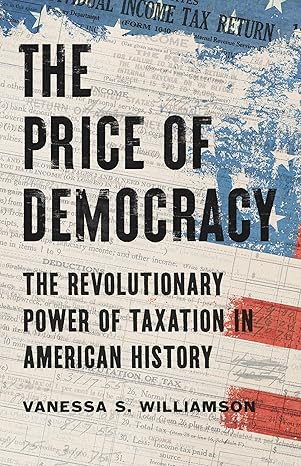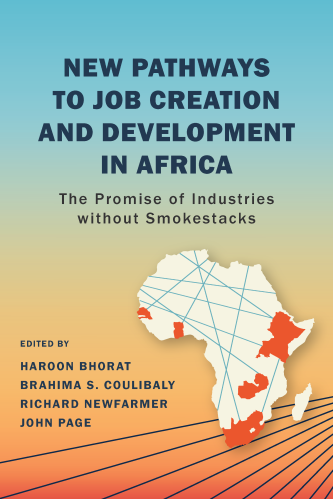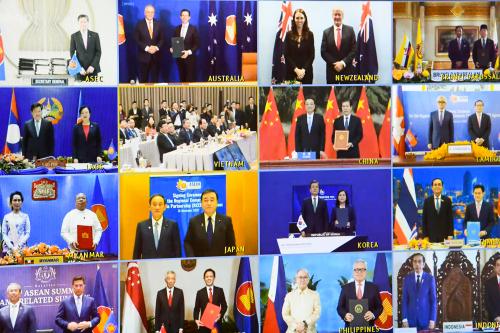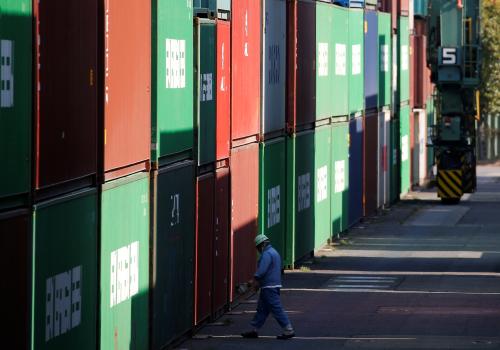The recognition of a state’s sovereignty, either by other countries or by the United Nations, can have sizeable economic impacts. Understanding the economic effects of this ostensibly non-economic issue is valuable not only for new or potential new states but also for countries whose sovereignty remains a political issue—such as Taiwan—as well as for disputed territories, such as Northern Cyprus (with the Republic of Cyprus) and Transnistria (with Moldova).
Kosovo, a partially recognized state, is a good case for estimating the economic cost of not being fully recognized as a country. Despite declaring independence in 2008, the country has yet to obtain recognition from some countries (bilateral recognition) or U.N. country membership (multilateral recognition).
Kosovo’s contested status creates challenges for its businesses, from difficulties of travel to complications in the exchange in goods and services. For example, until recently, Kosovo did not have a postal system. Instead, the Albanian postal service would receive post from abroad and deliver it to Kosovo, making sending and receiving goods difficult. Money transfers were also problematic, as Kosovar banks have only recently been assigned the SWIFT codes that are needed for international transactions. Until this happened, firms used intermediary banks, a practice that meant additional administrative procedures, restricted availability of online transactions, and increased costs.
Access to essential business services like postal delivery and money transfers is regulated by legal agreements that often make such services available only to states officially recognized by the U.N. The inability of businesses from Kosovo and other nations that are not universally recognized as states to access these services increases time and costs of trade and compromises their ability to engage in international trade.
A brief history of Kosovo’s recognition—and its technical implication
A sizeable number of states—110 U.N. member states as of 2017—have officially recognized Kosovo since it declared independence in 2008. This number is less than two-thirds of the world’s countries, which is the threshold that Kosovo must reach in order to become a member of the U.N. once its membership is recommended by the U.N. Security Council.
Kosovo has been trying hard to become a member state of the U.N., but faces complex political challenges. The countries that do not recognize its sovereignty tend to have internal “minority” issues, or historical ties with former Yugoslavia. Some of these countries—such as Serbia—are also among Kosovo’s biggest trading partners. In order to reach the U.N. threshold, Kosovo has been reaching out to countries with whom it has few economic or political ties, such as distant small island states. So countries that trade a lot with Kosovo are not necessarily the same countries that recognize it as a state, and vice versa.
Technically speaking, this pattern implies that there is no endogeneity of trade and recognition; that is, we can assume that bilateral trade flows and recognition status are unlikely to strongly affect each other. This in turn allows us to analyze the impact of country recognition on Kosovo’s trade flows using standard economic methods.
The trade costs of not being recognized
In a paper with Asier Minondo of Deusto Business School, we use a gravity model of trade that predicts trade flows based on the common factors that influence trade (such as the size of the economy and the distance between trade partners) to test whether not being recognized as a country is a trade barrier for Kosovo. The model predicts how much Kosovo would trade with each country and with the world in general if its statehood were universally accepted. We estimate the impact on trade of not being recognized by another country (“bilateral nonrecognition”) and by the U.N. (“multilateral nonrecognition”), as well as the impact on the value of exports, the number of exporters (intensive margin), and the exports per firm (extensive margin). Then we examine whether the cost of nonrecognition is larger for some products than for others.
The Figure 1 shows the trade flows over time between Kosovo and its trading partners, which are grouped by their recognition of Kosovo’s sovereignty. Note the rapidly rising exports to countries that decided to recognize Kosovo during this period (red line).
Figure 1: Kosovo trade, by recognition status of trading partner, 2008-2015
However, the results of our gravity model, holding the above mentioned common factors that influence trade, are:
- Bilateral nonrecognition does not have a significant effect on the value of bilateral exports or imports, but we find that bilateral nonrecognition has a negative effect on the number of exporters.
- Kosovo trades much less than it should, given its endowments, implying that there is an unknown “Kosovo-specific factor” that reduces trade.
Our hypothesis is that it is the lack of U.N. membership, which restricts access to multilateral treaties and prevents representation in international government. These are prerequisites for access to basic legal, financial, and logistical services, without which the basic logistics of trade become costly.
Our findings suggest that obtaining (bilateral) recognition from new countries will not cause a dramatic increase in Kosovo’s trade with those countries; however, once the country obtains (multilateral) U.N. membership, its trade could surge. Our interviews with Kosovar businesses reveal that the main consequence of bilateral non-recognition for them is that they find it difficult to travel to countries that do not recognize Kosovo, whereas multilateral recognition increases the overall cost of exchanging goods and services with firms abroad, which is a bigger concern.
Based on our calculations, the cost of trading with Kosovo today is the equivalent of a 14 percent tariff, which is enormous. In a global market increasingly reliant on convenience and speed, it is a surprisingly large consequence of disputed sovereignty.
Secession is costlier than you thought it was
These findings highlight the importance of U.N. recognition to trade, an issue seemingly unrelated to economic concerns. The findings also provide a warning of the unexpected costs of secession. The literature on diplomacy and trade finds that diplomatic problems increase trade costs. More broadly, the growing literature on economic diplomacy and trade reveals that economic diplomacy, such as having export promotion agencies and state visits, promotes trade and foreign direct investment. In a world where rising trade openness has not yet closed the globalization gap, we need a better understanding of the effects that state recognition has on trade. We hope this work serves as a useful starting point.
The findings, interpretations, and conclusions expressed in this article are entirely those of the author. They do not necessarily represent the views of the International Bank for Reconstruction and Development/World Bank and its affiliated organizations, or those of the executive directors of the World Bank or the governments they represent.
The Brookings Institution is committed to quality, independence, and impact.
We are supported by a diverse array of funders. In line with our values and policies, each Brookings publication represents the sole views of its author(s).











Commentary
The costs of not being recognized as a country: The case of Kosovo
November 16, 2017